|
Featured picture tools: |
These featured pictures, as scheduled below, appeared as the picture of the day (POTD) on the English Wikipedia's Main Page in October 2010. Individual sections for each day on this page can be linked to with the day number as the anchor name (e.g. [[Wikipedia:Picture of the day/October 2010#1]] for October 1).
You can add an automatically updating POTD template to your user page using {{Pic of the day}} (version with blurb) or {{POTD}} (version without blurb). For instructions on how to make custom POTD layouts, see Wikipedia:Picture of the day.Purge server cache
October 1

|
The Pūkeko (Porphyrio porphyrio melanotus) is a subspecies of the Purple Swamphen, native to New Zealand and elsewhere in Australasia. The name comes from the Māori language; the bird is highly revered in Māori culture because the colour red is associated with nobility and power, and the species has red beaks and legs. It is unknown how the species spread to New Zealand from Australia. It may have been brought by ancestors of Māori, or it may have arrived there on its own. Photo: Fir0002
Recently featured:
|
October 2

|
|
A panoramic view of South 9th Street, Philadelphia, Pennsylvania, which is the location of the Italian Market, a commercial area of the city featuring a strong Italian American influence. Italian immigrants began to move into the area around 1884 and many of the present vendors can trace the founding of their businesses back to the first decade of the 20th century. The mural on the left shows Frank Rizzo, mayor of Philadelphia from 1972 to 1980. Photo: Massimo Catarinella
Recently featured:
|
October 3

|
The Aldabra Giant Tortoise (Geochelone gigantea), from the islands of the Aldabra Atoll in the Seychelles, is one of the largest tortoises in the world. Similar in size to the famous Galapagos Giant Tortoise, its carapace averages 120 centimetres (47 in) in length. The average weight is around 250 kilograms (550 lb) for males and 150 kilograms (330 lb) for females. Photo: Muhammad Mahdi Karim
Recently featured:
|
October 4

|
Ceriagrion glabrum is a species of damselfly found throughout much of Africa, except for arid locations. The males are orange and green (seen on top here) whilst the females (bottom) range from light brown to dark brown depending on their maturity. The darkened colours in females aid in reproduction. Photo: Muhammad Mahdi Karim
Recently featured:
|
October 5
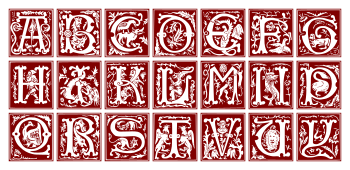
|
A set of 16th-century initial capitals, missing a few letters. An initial is a letter at the beginning of a work, chapter or paragraph that is larger than the rest of the text. It is often several lines in height and in older books or manuscripts sometimes ornately decorated. Artist: Unknown; Vectorization: JovanCormac
Recently featured:
|
October 6

|
The Palm House at the Royal Botanic Gardens in Kew, an area in the London Borough of Richmond upon Thames in South West London. The institution has the world's largest collection of living plants (over 30,000) as well as one of the world's largest herbariums, with over 7 million specimens. Photo: David Iliff
Recently featured:
|
October 7

|
The flower of a Red Flowering Gum (Corymbia ficifolia), one of the most commonly planted ornamental trees in the broader eucalyptus family. It is native to a very small area of South Coast Western Australia, but is not considered under threat in the wild. The common name is somewhat of a misnomer, as the flowers may not necessarily be red, nor is it really a gum tree, but a bloodwood instead. Photo: Noodle snacks
Recently featured:
|
October 8
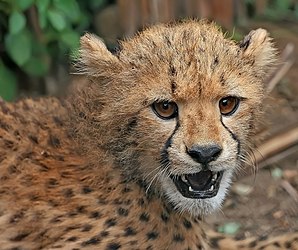
|
A close-up view of a cheetah (Acinonyx jubatus) cub. Unlike some other cats, the cheetah is born with its characteristic spots, as well as a downy underlying fur on their necks extending to mid-back, which gives the cub the appearance of the Honey Badger, to scare away potential aggressors. Despite this, up to 90% of cheetah cubs are killed by predators in the early weeks of life. Healthy adult cheetahs have few predators because of their speed. Photo: Muhammad Mahdi Karim
Recently featured:
|
October 9

|
A 99.995% pure titanium crystal bar, about 14 cm (5.5 in) in length and weighing about 283 g (10.0 oz), made by the iodide process. Titanium has the highest strength-to-weight ratio of any metal and is resistant to corrosion. It can be alloyed with other metals for a wide variety of industrial purposes. Photo: Alchemist-hp
Recently featured:
|
October 10

|
An animated image showing the long-term mean monthly precipitation around the world. Precipitation occurs when a local portion of the atmosphere becomes saturated with water vapor and condenses, forming rain drops or ice crystals within a cloud via collision that then fall to the surface, except for virga, which evaporates while in the air. Image: PZmaps
Recently featured:
|
October 11

|
A Skylark (Alauda arvensis), with two beetles in its beak. Skylarks are found throughout much of the world. It is a mostly dull-looking bird, being mainly brown above and paler below. They are known for the song of the male, which is delivered in hovering flight from heights of 50 to 100 m (160–330 ft). Photo: David Iliff
Recently featured:
|
October 12

|
A c. 1639 nautical map of Hispaniola (center-left), the most populous island in the Americas, and Puerto Rico (right). The name originally given by Christopher Columbus, who founded the first European colonies in the New World here during his first two voyages, was La Isla Española ("the Spanish island"), which was shortened to Española and then Latinised to Hispaniola. Map: Johannes Vingboons; Restoration: Lise Broer
Recently featured:
|
October 13

|
A blank membership certificate for B'nai B'rith, the world's oldest continually operating Jewish service organization. B'nai B'rith was founded on October 13, 1843, in New York City by Henry Jones and 11 others as a Jewish counterpart of fraternal orders then flourishing in the United States, but soon began to exercise political influence on behalf of world Jewry. Today, B'nai B'rith engages in community service and welfare activities in more than 50 countries. Image: Louis Kurz; Restoration: Lise Broer and Adam Cuerden
Recently featured:
|
October 14

|
A Lophyra species tiger beetle, one of a large group of insectivorous beetles found throughout the world. Both adults and larvae are predatory. The latter live in cylindrical burrows and will capture prey that wanders above the ground. Some species can run at a speed of 8 km/h (5 mph), making them the fastest running land animals for their size. Photo: Muhammad Mahdi Karim
Recently featured:
|
October 15

|
The Munttoren, a tower in Amsterdam, the Netherlands, as seen from the river Amstel at dusk. The tower was originally part of the Regulierspoort, one of the main gates in Amsterdam's medieval city wall, dating to 1487. After a fire destroyed the gate in 1618, the tower was rebuilt in the Amsterdam Renaissance style, with an eight-sided top half and open spire designed by Hendrick de Keyser, featuring a clock with four faces and a carillon of bells. The name ("Mint Tower") refers to the time when it was temporarily used to mint coins in the Rampjaar ("disastrous year") of 1672 when both England and France declared war on the Dutch Republic, and silver and gold could not be safely transported to Dordrecht and Enkhuizen, where coins were normally minted. Photo: Massimo Catarinella
Recently featured:
|
October 16

|
The flower of a Rosemary Grevillea (Grevillea rosmarinifolia), a popular evergreen garden plant native to New South Wales in Australia. The leaves are needle-like, 0.8 to 3.8 cm (0.3–1.5 in) long, which gives the plant an appearance similar to rosemary. Photo: Noodle snacks
Recently featured:
|
October 17

|
An illustration from an 1893 version of A Wonder-Book for Girls and Boys by Nathaniel Hawthorne, which recounted the tale of King Midas. In Greek mythology, Midas was given ability to turn everything he touched into gold by the god Bacchus. However, he soon discovered that he was unable to even eat. Bacchus told him to wash in the river Pactolus, and the power flowed in the river, which was supposedly the reason for why the river was so rich in gold in later years. In Hawthorne's version, Midas' touch even turned his daughter to gold (pictured here). Artist: Walter Crane; Restoration: Lise Broer
Recently featured:
|
October 18

|
The anatomy of a Périnet piston valve, this one taken from a B♭ trumpet. When depressed, the valve diverts the air stream through additional tubing, thus lengthening the instrument and lowering the harmonic series on which the instrument is vibrating (i.e., it lowers the pitch). Trumpets generally use three valves, with some variations, such as a piccolo trumpet, having four. When used singly or in combination, the valves make the instrument fully chromatic, or capable of playing all twelve pitches of classical music. Trumpets may also use rotary valves instead. Photo: Guillaume Piolle
Recently featured:
|
October 19

|
Mushrooms of Armillaria hinnulea, a species of honey fungus (or "pidpenky", from Ukrainian). Honey fungi are parasitic fungi that live on trees and woody shrubs. As a forest pathogen, it can be very destructive because unlike most parasites, it does not need to moderate its growth in order to avoid killing its host, since it will continue to thrive on the dead material. Honey fungi are long lived and form some of the largest living organisms in the world, including one that covers more than 3.4 sq mi (8.8 km2) and is thousands of years old. The mushrooms are edible, but can be easily confused with poisonous Galerina species, which can grow side-by-side with Armillaria. Photo: Noodle snacks
Recently featured:
|
October 20

|
A full-length portrait of then-French Marshal Jean Baptiste Bernadotte (1763–1844), who later became King Charles XIV John of Sweden and Norway. Bernadotte had a long and decorated career in the French Army, when he was unexpectedly elected the heir to the childless King Charles XIII. His election was due to two main factors: the Swedish Army were in favour of electing a soldier in view of future complications with Russia, and he had shown kindness to Swedish prisoners during the recent war with Denmark, part of the Napoleonic Wars. Although he never learned to speak Swedish, during his reign, Sweden and Norway became united, and both experienced great material development. Artist: Joseph Nicolas Jouy
Recently featured:
|
October 21

|
An engraving of English philosopher and poet Samuel Taylor Coleridge (1772–1834), most famous for his poems The Rime of the Ancient Mariner and Kubla Khan. Coleridge was a member of the Lake Poets who, with his friend William Wordsworth, founded the Romantic Movement in England. He also helped introduce German idealism to English-speaking culture and was influential on American transcendentalism (via Ralph Waldo Emerson). Throughout his adult life, Coleridge suffered from crippling bouts of anxiety and depression, which he chose to treat with opium, becoming an addict in the process. He died at age 61 due to symptoms typical of prolonged opium usage. Engraving: Samuel Cousins; Artist: Washington Allston; Restoration: Lise Broer
Recently featured:
|
October 22
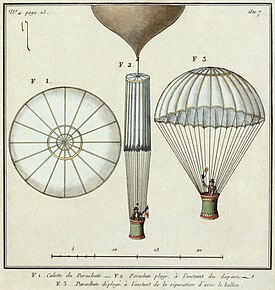
|
A schematic depiction of the first successful frameless parachute, invented by André-Jacques Garnerin (1769–1823). On October 22, 1797, Garnerin rode in a basket hanging from the parachute, which was attached to the bottom of a hot air balloon (centre). At a height of approximately 3,000 feet (910 m), he severed the rope that connected his parachute to the balloon. The basket swung during descent, then bumped and scraped when it landed, but Garnerin emerged uninjured. Artist: Unknown; Restoration: Lise Broer
Recently featured:
|
October 23
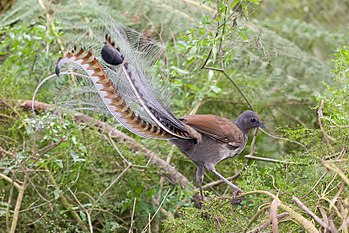
|
The Superb Lyrebird (Menura novaehollandiae) is a pheasant-sized songbird endemic to Australia. At approximately 100 cm (39 in) long, it is the longest of all songbirds. The male (shown here) has a showy tail, with the two outermost feathers forming the shape of a lyre. Photo: Fir0002
Recently featured:
|
October 24

|
A Meadow Argus (Junonia villida) butterfly, with its wings closed in a resting position. The species is found mainly in Australia and neighboring islands, but it was also accidentally introduced to the United Kingdom, where it is known as Albin's Hampstead Eye. Photo: Noodle snacks
Recently featured:
|
October 25
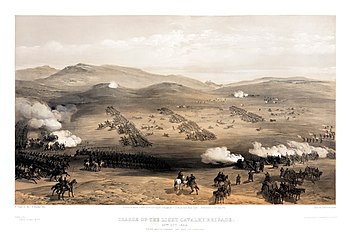
|
On October 25, 1854, during the Battle of Balaclava in the Crimean War, British cavalry units charged heavily fortified Russian opposition, an action known as the Charge of the Light Brigade. By mischance, they attacked the wrong target, as the orders were unclear, and as a result suffered great casualties. Alfred, Lord Tennyson's famous poem made the charge a symbol of warfare at both its most courageous and its most tragic. Artist: William Simpson; Restoration: Adam Cuerden
Recently featured:
|
October 26

|
The Blue Potato Bush is one of about 200 species in the genus Lycianthes, which are found mostly in tropical regions of the Americas, and others located in the Asia-Pacific region. Lycianthes is apparently closely related to the chili peppers (Capsicum). However, it was long confused with the nightshades (Solanum), and several little-known Solanum species presumably should be included with Lycianthes. Photo: Noodle snacks
Recently featured:
|
October 27

|
Mandarin Ducks by Japanese woodblock artist Hiroshige Utagawa, accompanied by a poem which reads: Out in a morning wind, Hiroshige was a member of the Utagawa school, which was founded by Utagawa Toyoharu, whose primary innovation was his adaptation of linear perspective to Japanese subject matter. His pupil, Toyokuni I, took over after Toyoharu's death and raised the group to become the most famous and powerful woodblock print school for the remainder of the 19th century, so much so that today more than half of all surviving ukiyo-e prints are from it. In addition to Hiroshige, Kunisada, Kuniyoshi and Yoshitoshi were Utagawa students. Restoration: Lise Broer
Recently featured:
|
October 28

|
The headquarters of the Bank of Tanzania, located in Dar es Salaam, the central bank of the United Republic of Tanzania. It is responsible for issuing the national currency, the Tanzanian shilling. Since 1995, monetary policy has been its only responsibility. Photo: Muhammad Mahdi Karim
Recently featured:
|
October 29

|
A sealed vial of liquid bromine, encased in an acrylic cube, which is a common and secure way of presenting the chemical element for teaching purposes, as its vapors are corrosive and toxic. In nature, bromine exists exclusively as bromide salts in diffuse amounts in crustal rock. Organobromine compounds are used in a wide variety of products, including fire retardant, gasoline additives, pesticides, and anti-convulsant medicines. It has no known essential role in human or mammalian health. Photo: Alchemist-hp
Recently featured:
|
October 30

|
Unidentified species of mushrooms belonging to the Mycena genus, a large grouping of saprotrophic fungi. Mycena mushrooms are characterized by a white spore print, a small conical or bell-shaped cap, and a thin fragile stem. They are hard to identify to the species level and some are distinguishable only by microscopic features such as the shape of the cystidia. These specimens were observed in Mount Field National Park in Tasmania, Australia. Photo: Noodle snacks
Recently featured:
|
October 31
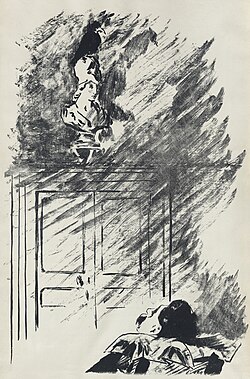
|
An illustration by Édouard Manet for a French publication of Edgar Allan Poe's narrative poem "The Raven". In the poem, the raven flies into the narrator's home and perches on a bust of Pallas Athena (seen here). The narrator then asks the bird a series of questions, to which the bird only replies, "Nevermore". Eventually, the narrator falls into despair and ends with his final admission that his soul is trapped beneath the raven's shadow and shall be lifted "Nevermore". Originally published in 1845, the poem was widely popular and made Poe famous, though it did not bring him much financial success. "The Raven" has influenced many modern works and is referenced throughout popular culture in films, television, music and more. Restoration: Lise Broer
Recently featured:
|
Picture of the day archives and future dates